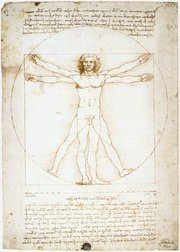|
|
The Da Vinci Code by Dan Brown
a summary and book review
The Da Vinci Code is a novel written by American author Dan Brown and first published
in 2003 that has become a worldwide bestseller with over nine million copies being sold.
The plot of this book concerns the attempts of Dr. Robert Langdon, Professor of Religious
Symbology at Harvard University, to solve the murder of Jacques Saunière,
the curator of the Louvre Museum in Paris, after Saunière's body had been found inside
the Louvre
naked with
a cryptic message written on his torso in his own blood and posed like Leonardo
da Vinci's famous drawing, Vitruvian Man:-

The plot continues in ways that combine the detective thriller and conspiracy theory genres with Saunière's murder
being attibuted to powerful forces that wish to preserve ancient secrets relating to Jesus
having been married to Mary Magdalene and having been the father of their child.
The interpretation of hidden messages inside Da Vinci's famous works, including the
Mona Lisa and The Last Supper, figure prominently in the solution to the mystery. The solution
itself is found to be intimately connected with the possible location of the Holy Grail and to
a mysterious society called the Priory of Sion, as well as to the Knights Templar.
The Catholic organization Opus Dei also figures prominently in the plot.
It transpires that Saunière was in fact the secret head of the Priory of Sion - an organisation
that was devoted to preserving certain secrets about the location of the Holy Grail.
The cryptic messages
on his body being his own dying attempts to leave an important message to his grand-daughter,
Sophie Neveu,
who was employed by the French state as a cryptologist.
According to the novel, the secrets of the Holy Grail, as kept by the Priory
of Sion, are as follows:
- The Holy Grail is not a physical chalice, but a woman, namely
Mary Magdalene, who helped to
carry the bloodline of Christ into the following ages.
- Mary Magdalene was of
royal descent (through the Jewish House of Benjamin) and was
the wife of Jesus, of the House of David. That she was a
prostitute was a slander invented
by the Catholic Church to obscure
their true relationship. At the time of the Crucifixion, she was
pregnant. After the Crucifixion, she fled to Gaul, where she was sheltered by
the Jews of Marseilles. She gave birth
to a daughter, named Sarah. The bloodline of Jesus and Mary Magdalene became
the Merovingian dynasty of France.
- The French expression for the Holy Grail, San gréal, actually is
a play on Sang réal, which literally means "royal blood".
- The Grail relics consist of the documents that testify to the bloodline,
as well as the actual bones of Mary Magdalene.
- Sophie Neveu and her brother are descendants of the original bloodline of
Jesus and Mary Magdalene (their last name was changed to hide their ancestry).
- The existence of the bloodline was the secret that was contained in the
documents discovered by the Crusaders after they
conquered Jerusalem in 1099. The Priory of Sion and the
Knights Templar were
organized to keep the secret.
The Da Vinci Code has been criticised by many scholars but it has
undoubtedly helped to
spur widespread popular interest in certain theories concerning the legend of the Holy
Grail and the role of Mary Magdalene in the history of Christianity.
|
|
![[Da Vinci Code]](review.gif)
![[Da Vinci Code]](review.gif)